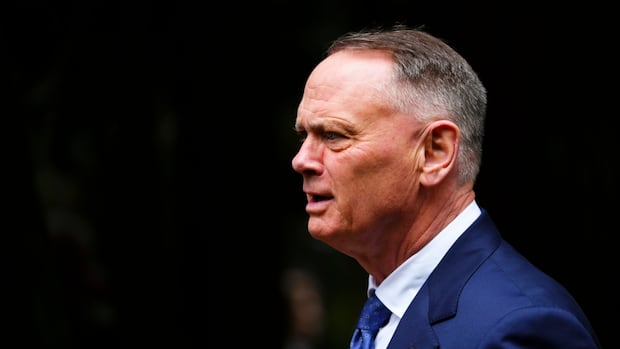[
Defence Minister David McGuinty called allegations that military members were part of an extremist plot “disturbing,” but pushed back against accusations the Canadian Armed Forces (CAF) isn’t doing enough to change its culture.
The minister briefly spoke to reporters Thursday on the sidelines of a change-of-command ceremony. They were his first public comments since the RCMP charged four men, including two CAF members and one former member, of amassing a trove of weapons and explosives as part of a scheme to take over land near Quebec City.
“It’s deeply concerning. We reject completely this kind of behaviour, these beliefs, this system, these activities,” he said.
“This is disturbing, of course, but we’re moving forward in rebuilding and rearming and reinvigorating the Canadian Armed Forces.”

Cpl. Marc-Aurèle Chabot, Simon Angers-Audet and Raphaël Lagacé have been charged with the serious offence of facilitating a terrorist activity. The RCMP said they were planning to form an “anti-government militia.”
Angers-Audet’s father told La Presse his son formerly served in the army. Lagacé’s Facebook account shows he was involved with the Royal Canadian Air Cadets.
Cpl. Matthew Forbes, who served at CFB Valcartier with Chabot, faces charges including unauthorized possession of firearms and illegally transferring devices.
Police characterized the plot as an act of “ideologically motivated violent extremism.”
The allegations have not been tested in court.
‘Sophisticated, deep investigation’
McGuinty said extremism “is not something that is unknown to armed forces around the world.”
“I think what it says is that the question of extremism is something that’s throughout Canadian society,” said the minister, who before joining cabinet was chair of one of the country’s national security watchdogs.
He wouldn’t provide specifics about the case that’s just beginning its journey through the justice system.
Defence Minister David McGuinty on Thursday addressed allegations by the RCMP accusing four men, including two Canadian Armed Forces members, of amassing a trove of weapons and plotting to seize land near Quebec City.
McGuinty said the charges follow a “sophisticated, deep investigation.”
While the motivation of the four accused is still largely unknown, the armed forces have been under pressure for years to better handle soldiers drawn to hateful views and extremism.
A recent report from the military’s advisory panel on systemic racism and discrimination found the number of members belonging to extremist groups was on the rise.
The report called out the military for not doing enough to detect white supremacists and other violent extremists and prevent them from infiltrating its ranks, despite a mounting pile of reports and surveys pointing to the problem.
It came after a U.S. judge sentenced former Manitoba army reservist Patrik Mathews to nine years in prison for charges related to what the FBI described as a neo-Nazi plot to instigate a race war in the United States.
Another report, this one from former Supreme Court Justice Louise Arbour, called for culture changes in the wake of multiple sexual misconduct accusations.
Both made a series of recommendations to clean up the force’s culture.
“Many recommendations have been implemented. Changes have been affected,” said McGuinty. “There’s so much activity going on that’s positive. That’s where my focus is”
Two active members of the Canadian Armed Forces are among four Quebec men accused of being part of an alleged anti-government plot that involved creating a militia and seizing land.
Queen’s University professor Amarnath Amarasingam, who has researched the overlap between extremism and military service, said the armed forces’ efforts are still in their infancy — conducting studies and working with experts to develop approaches to detect and root out extremist elements.
“It’s still very early,” he told CBC’s The Current.
He said getting a handle of the degree of extremism in the CAF is a tough task.
“It’s a little bit more complicated than, say, if you find an ISIS supporter,” he said, whose ideology is more clear and the organization is a listed terrorist entity.
Ideologically motivated extremism “runs the gamut between someone who is looking at incel ideology, to accelerationists, to old-school neo-Nazi skinheads,” he said.
“It just becomes a lot more sticky, you know, where free speech ends and where some of this hate speech begins.”
The four accused remain in custody and are back in court Monday.


